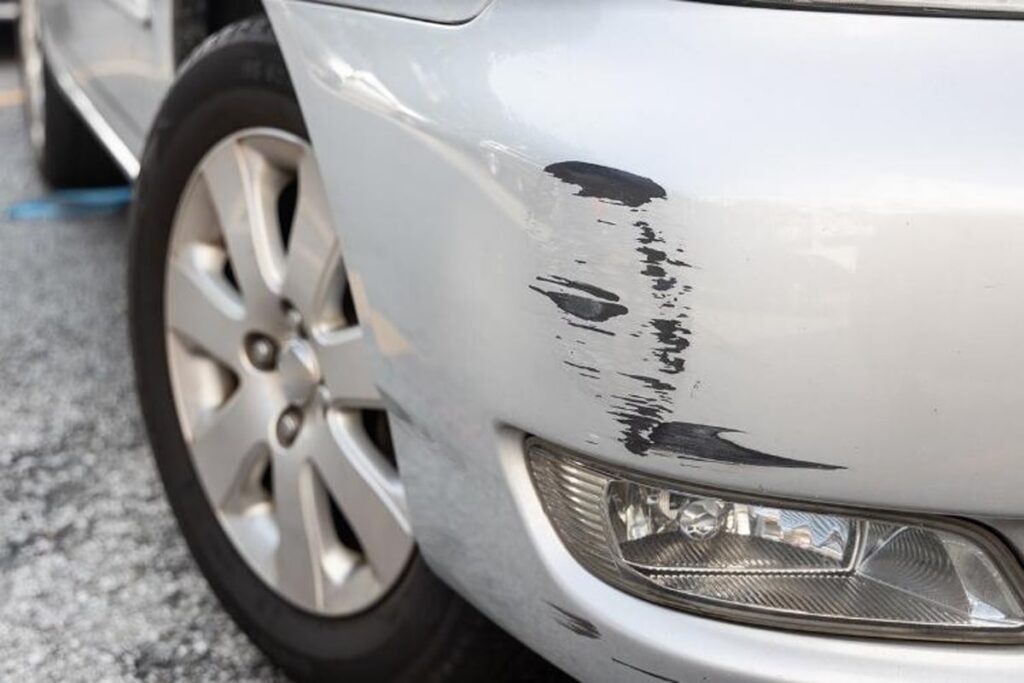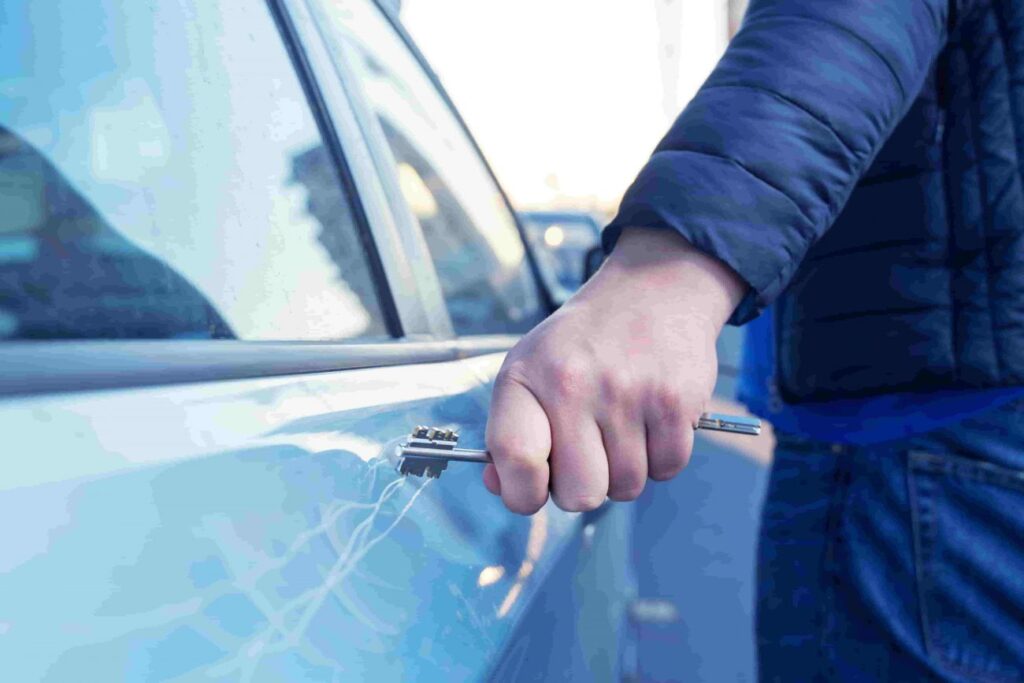Scratching someone else’s car and leaving the scene without taking responsibility is considered a hit-and-run or a hit-and-skip offense. Penalties for such actions vary depending on the jurisdiction and the extent of the damage caused. In many places, it is a criminal offense, and consequences may include fines, probation, community service, license suspension, or even imprisonment.
If you accidentally scratch someone’s car, it’s important to take the responsible steps. You should attempt to locate the owner of the vehicle and provide your contact information. If you cannot find the owner, leaving a note with your contact details is often the appropriate course of action.
Failure to take responsibility for damaging someone else’s property not only has legal consequences but can also lead to increased penalties and difficulties if you are eventually identified. It’s always best to handle such situations ethically and legally to avoid further complications.
How do hit-and-run laws vary in penalty for car damage?

Hit-and-run laws and penalties for car damage can vary significantly depending on the jurisdiction (state or country) and the specific circumstances of the incident. Generally, hit-and-run refers to leaving the scene of an accident without stopping to provide identification or assistance to the parties involved. Penalties for hit-and-run can encompass both criminal and civil consequences. Here are some factors that may influence the penalties:
Severity of Damage
The extent of damage caused to the vehicles involved can be a factor in determining penalties. More serious damage may lead to more severe consequences.
Injuries or Fatalities
If the accident resulted in injuries or fatalities, the penalties are likely to be more severe. In many jurisdictions, leaving the scene of an accident with injuries is treated more harshly than a simple property damage hit-and-run.
Criminal Charges
Hit-and-run offenses can result in criminal charges, which may include fines, probation, community service, and even imprisonment. The severity of the criminal charges may depend on the specific laws of the jurisdiction.
License Consequences
A hit-and-run conviction can lead to the suspension or revocation of the driver’s license. The duration of the suspension or revocation may vary.
Insurance Consequences
A hit-and-run incident can affect the at-fault driver’s insurance rates. They may be classified as a high-risk driver, leading to increased premiums or difficulty obtaining coverage.
Civil Liability
In addition to criminal penalties, the at-fault driver may be held civilly liable for the damages caused. This can include compensation for property damage, medical expenses, and other losses suffered by the victims.
Criminal Intent
Some jurisdictions differentiate between accidents where the driver was unaware of the collision and those where the driver intentionally fled the scene. Intentional hit-and-run may result in more severe penalties.
It’s important to consult the specific laws and regulations of the jurisdiction where the incident occurred to understand the applicable penalties. Penalties can vary widely, so it’s crucial to be aware of the local laws and their nuances. If you are involved in a hit-and-run incident or have questions about the laws in your area, it’s advisable to consult with a legal professional for guidance.
What are the ethical considerations in a hit-and-run car scratching incident?
Ethical considerations in a hit-and-run car scratching incident involve principles of responsibility, accountability, honesty, and respect for others. Here are some ethical considerations to keep in mind:
Responsibility and Accountability
Ethically, individuals have a responsibility to take ownership of their actions. If you accidentally scratch another person’s car, it is generally considered ethically responsible to admit your mistake and take steps to rectify the situation.
Honesty
Honesty is a fundamental ethical principle. Leaving the scene of a car scratching incident without providing your information is considered dishonest and lacks integrity. Ethical behavior would involve staying at the scene and acknowledging the mistake.
Respect for Others
Ethical behavior includes showing respect for others and their property. Fleeing the scene of an incident, even if it seems minor, disrespects the other person’s property rights and can be seen as a breach of ethical conduct.
Compassion
Ethical behavior involves considering the impact of your actions on others. Leaving the scene without providing information may cause the other party stress, inconvenience, and financial burden. Acting with compassion means acknowledging the potential consequences and taking steps to mitigate them.
Legal Compliance
Ethical behavior often aligns with legal compliance. Leaving the scene of an accident, even if it’s just a minor scratch, may violate traffic laws and can have legal consequences. Ethical behavior would involve complying with the law.
Personal Integrity
Ethical decision-making is linked to personal integrity. Acting with integrity means doing the right thing even when it’s difficult or inconvenient. This might involve staying at the scene, exchanging information, and reporting the incident.
Consideration for Others’ Well-being
Ethical considerations include recognizing the potential stress and anxiety the other party may experience due to the incident. Being considerate of others’ well-being involves taking actions to minimize any negative impact on them.
In summary, the ethical response to a hit-and-run car scratching incident involves taking responsibility for one’s actions, being honest and transparent, respecting others and their property, showing compassion, complying with the law, and acting with personal integrity. While it might be tempting to avoid the situation, ethical behavior requires facing the consequences of our actions and taking steps to make amends.
How should one responsibly handle accidentally damaging another person’s car?

Accidentally damaging another person’s car can be a stressful situation, but handling it responsibly is essential. The first step is to stay at the scene of the accident, as leaving without providing information is not only unethical but may also be illegal. Assess the extent of the damage and, if the owner of the damaged vehicle is present, inform them immediately about the incident, offering sincere apologies and being honest about what happened.
Exchange contact information, including names, phone numbers, addresses, and insurance details. Document the scene by taking pictures of the damage to both vehicles, as these photos will be valuable for insurance purposes. Depending on local laws, report the accident to the police, and, if necessary, seek medical assistance for injuries. Report the incident to your insurance company promptly, providing them with all relevant details and documentation.
Offer assistance to the other party if needed, and follow up with both the other party and your insurance company to ensure a smooth resolution. Throughout the process, be courteous, calm, and cooperative, understanding that accidents happen and taking steps to rectify the situation responsibly.
FAQ’s
Can I sue the police for not investigating UK?
Generally, it’s challenging to sue the police for not investigating, as they have discretion in allocating resources, but there may be exceptions.
Can UK police check your phone?
In certain circumstances, the UK police can check your phone with proper authorization, like a warrant, related to an ongoing investigation.
What happens if you don’t report an accident within 24 hours UK?
Failure to report an accident within 24 hours in the UK can result in penalties, including fines or other legal consequences.
Do you have to report a minor car accident to the police UK?
It’s not always necessary to report a minor car accident to the police in the UK; however, you must exchange information with the involved parties.
Who is at fault in a car park accident UK?
Fault determination in a car park accident in the UK depends on the circumstances; it could be shared, or one party may be deemed entirely at fault.
Do UK police cars have cameras?
Many UK police cars are equipped with cameras for various purposes, including recording incidents during patrols.
Final Words
The penalties for hit-and-run incidents involving car damage can vary significantly based on jurisdiction and the specific circumstances of the incident. The severity of the damage, the presence of injuries or fatalities, criminal charges, license consequences, insurance implications, civil liability, and the presence of criminal intent all play crucial roles in determining the penalties.
It is imperative for individuals to be aware of the local laws and regulations governing hit-and-run incidents in their area and consult with legal professionals for guidance if involved in such situations.

